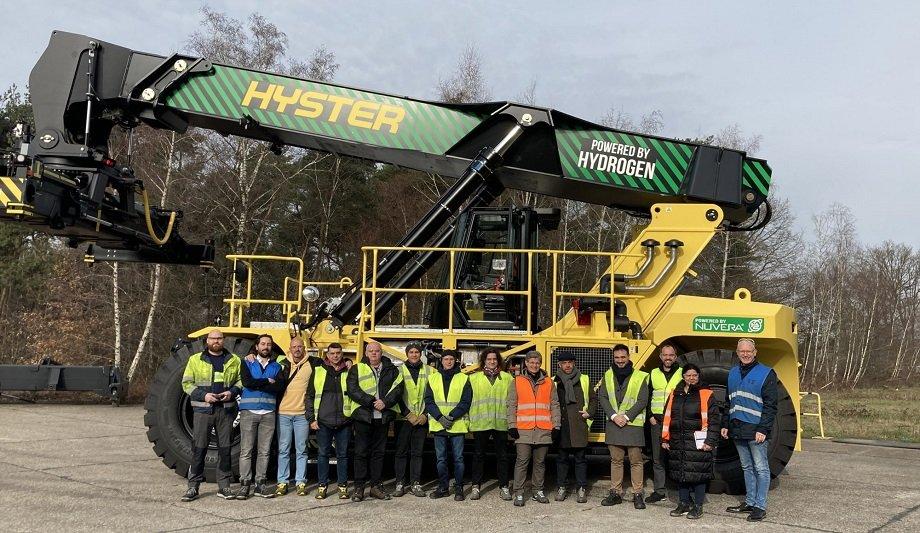A delegation composed of staff from Fundación Valenciaport, the MSCTV terminal, and representatives of the Valencia dockers visited the Hyster-Yale Group facilities in Weeze (Germany) to test the operation of the hydrogen reach stacker that Hyster is developing in the framework of the European H2PORTS project.
The main objective of this visit is for both the group of stevedores and the terminal staff to spend as much time as possible with the machine to familiarise themselves with its operation and to be able to detect possible adjustments to be made before the machine is sent to the Port of Valencia to begin the testing period in real operations.
Online training
The mobile Hydrogen Refuelling Station will guarantee the supply of this fuel in suitable conditions
Prior to this visit, the group received online training on 10 February to learn about the technical details of the ReachStacker, the expectations related to how to operate the truck, and the planning of the deployment of the truck.
This hydrogen-powered ReachStacker will be tested for 2 years after arrival at the MSCTV terminal in real-life operations. The mobile Hydrogen Refuelling Station, developed by CNH2 and managed by Carburos Metálicos, will guarantee the supply of this fuel in suitable conditions both for this pilot and for the 4×4 terminal tractor that will be proved at Valencia Terminal Europa, part of Grimaldi Group, also powered by fuel cells.
Container handler device
A Reachstacker is a container handler device designed to move containers over short distances. This implies a very demanding power delivery pattern that the hydrogen fuel cell will fulfill. The Hyster-Yale ReachStacker is expected to offer comparable performance to a conventional truck in terms of capacity and lift and driving speeds, helping to support similar productivity levels.
When matched with the right application and operating intensity, Hyster expects that the hydrogen-powered ReachStacker will provide up to one day of operation before a refill is required. For convenience and flexibility, the Hyster-Yale ReachStacker in development is intended to comply with the standard H2 filling station connection (SAE standard), enabling global use.
H2PORTS
Its main objective is to test and validate hydrogen technologies on port machinery
The European project “H2PORTS – Implementing Fuel Cells and Hydrogen Technologies in Ports” is an initiative coordinated by Fundación Valenciaport in close collaboration with the Port Authority of Valencia and financed by the Clean Hydrogen JU, the successor of Fuel Cells and Hydrogen Joint Undertaking (FCH JU) program.
Its main objective is to test and validate hydrogen technologies on port machinery that allow applicable and real solutions without affecting the performance and safety of port operations and producing zero local emissions.
Hydrogen technologies
The H2PORTS project will entail a total investment of 4 million euros and involves, in addition to Fundación Valenciaport and the Port Authority of Valencia, the Centro Nacional del Hidrógeno, and the private companies MSC Terminal Valencia, Grimaldi Group, Hyster-Yale, Atena Distretto Alta Tecnologia Energia Ambiente, Ballard Power Systems Europe, Carburos Metálicos and Enagás.
Thanks to this initiative, the Port of Valencia will be the first port in Europe to incorporate hydrogen technologies to reduce the environmental impact of its operations.
